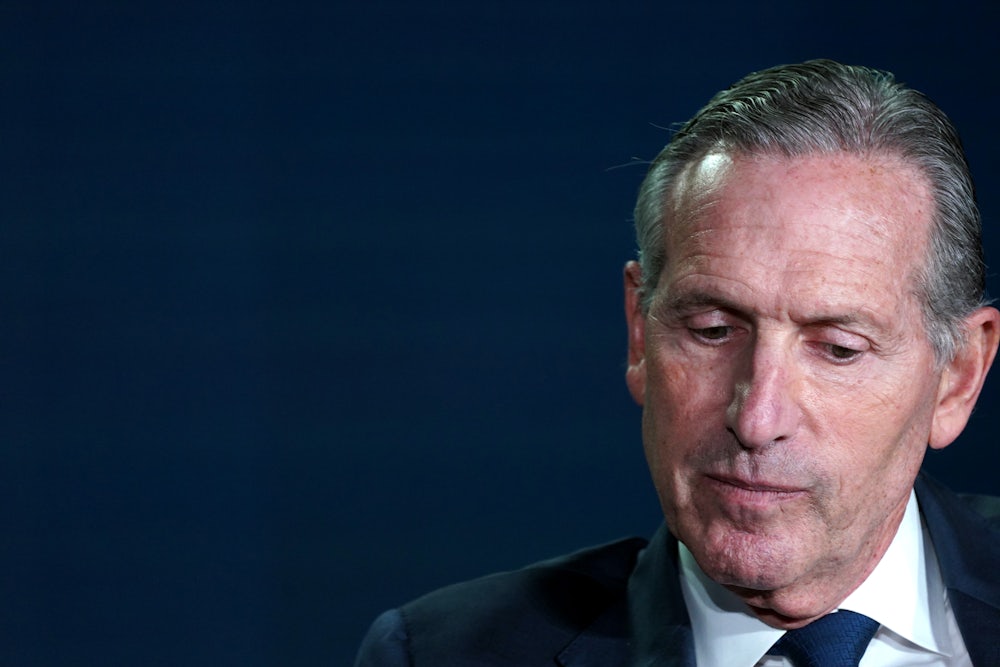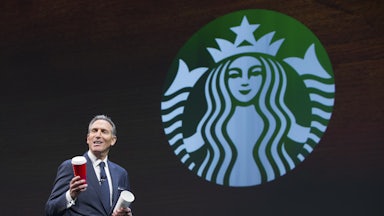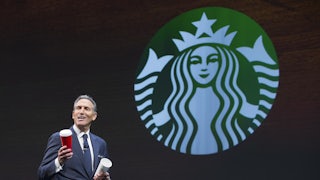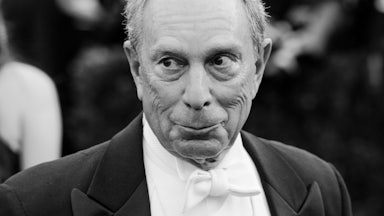Imagine you’re a multibillionaire. You own a private jet worth $65 million and, because you can, a $130 million superyacht with its own beauty salon, beach club, and helicopter pad. Would you have anything to complain about? If you’re Starbucks CEO Howard Schultz, the answer is apparently a resounding yes. Somehow or another, no amount of wealth is sufficient to keep Schultz from grousing over the fact that the workers he employs—whom the firm affectionately calls “partners”—want a democratic workplace and a small slice of his $113 billion pie.
It’s been nearly a year since the first Starbucks store voted to unionize, setting off a national movement that now extends to over 250 locations across the country. “Starbucks’ mission is improving communities one coffee at a time,” wrote workers at a Buffalo store in a letter to then–Starbucks CEO Kevin Johnson, shortly after they announced their union election. “Respecting partners’ rights to organize will help us help the company accomplish this mission by improving our lives and raising standards across the industry.” In response, Starbucks stated in a public letter that “we will bargain in good faith with the union that represents partners in the one Buffalo store that voted in favor of union representation.”
But 16 months after that letter was sent and with Howard Schultz back at the helm, to say Starbucks is bargaining in bad faith with its unionized workers is one of the largest understatements of 2022. Shortly after a number of stores in Buffalo were among the very first to form a union, Starbucks permanently closed one and temporarily closed the other, a move that some workers viewed as an intimidation tactic. Starbucks continued to close locations throughout the year, shuttering 16 stores due to “safety concerns”; not coincidentally, some of these were either unionized or were rumored to be in the process of forming a union. According to Starbucks Workers United, Starbucks has fired over 100 union leaders, some of whom were eventually reinstated, but only after a federal judge ordered Starbucks to do so. After months of delays, representatives for Starbucks eventually met with union members at the bargaining table in October to begin negotiations—only to walk out after mere minutes because they disliked that some union members joined over Zoom.
In total, Starbucks Workers United filed over 500 unfair labor practice charges against the corporate coffee giant. The National Labor Relations Board, the independent federal agency that protects the right to organize, issued 45 formal complaints against Starbucks, citing the company for coercing, threatening, and firing employees over their union activities, among other violations.
Schultz, for his part, doesn’t hide his contempt for the union. When asked during a live event with The New York Times over the summer if he could ever see himself embracing the union, Schultz gave a blunt, one-word answer: “No.” This, of course, runs counter to numerous statements from the corporation vowing to bargain in good faith with the union, as well as the National Labor Relations Act itself, which demands that during collective bargaining, employers must “confer in good faith with respect to wages, hours, and other terms and conditions of employment.”
So why is Schultz so aggressively busting the Starbucks union? One answer could be that he simply got his feelings hurt. According to some of Schultz’s close confidants, he took the decision from some stores to unionize personally, worried that it would damage his “good boss” reputation. For years, Schultz took pride in the fact that Starbucks offered above-market wages and benefits, for instance full health care coverage for part-time workers. At one point, ahead of the union vote in Buffalo, he even compared his generosity to that of Jews in concentration camps during the Holocaust. “Not everyone, but most people, shared their blanket with five other people,” Schultz said, adding that he was inspired to share his own blanket. “So much of that story is threaded into what we’ve tried to do at Starbucks—is share our blanket.”
Even if you overlook that perverse comparison, Schultz’s idea of “sharing our blanket” is grotesquely warped. Starbucks raked in $900 million in profits in the quarter ending in October, while its baristas averaged a little over $15 per hour in take-home pay. According to an analysis by the Institute for Policy Studies, it would take the average Starbucks worker at least 1,579 years to make what the company’s CEO made in 2021 alone.
Now, feeling the heat, Schultz has announced Starbucks will offer new wage increases and benefits, including credit card tipping—something the union has demanded since the beginning. But there’s a catch: According to Schultz, those benefits will only apply to nonunionized stores, leaving some Starbucks employees to choose between voting for a union or losing out on higher wages and new benefits.
Despite his best efforts to sink the union, Schultz has only really revealed its power to his employees. None of these sought-after perks would be on the table if workers at hundreds of stores hadn’t flexed their labor muscles and stood up to their union-busting employer. And as the “partners” who are still closing ranks at new locations across the country understand, a bad-faith actor like Schultz is only offering these benefits now because he fears the union will win something better. It’s an odd tribute to the man once short-listed to be Hillary Clinton’s labor secretary that the U.S. labor movement is getting a much-needed jolt from his desperate efforts to quash it.










